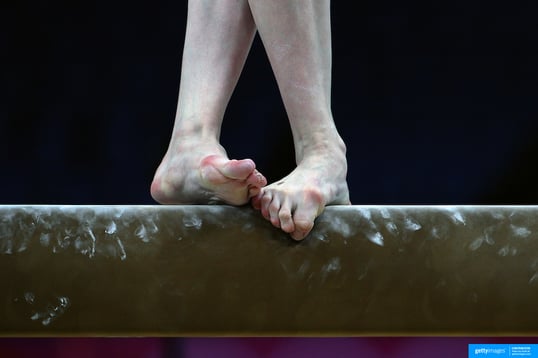Imagine living your life, doing your job, and being judged within a space that is 4 inches wide, 16 feet long and 4 feet from the floor.
Under such limits the consequences of violating boundaries are clear and the importance of maintaining balance is without question.
Thankfully, most of our day-to-day work and home lives are not bound by such drastic restrictions, yet finding equilibrium between the two can seem like an olympic-sized challenge.
My daughter was a competitive gymnast for most of her life. For the better part of 15 years she spent countless hours training and preparing her mind and physical body for the rigors of competition. I saw her fly, flip and power through the most difficult routines with grace and strength. I think I have as many pictures of her upside down, as I do right side up. I saw her nervous before her first meet. I saw her stand on top of the State Championship podium. I also saw her coming out of surgery to repair a blown knee. And I see her now, in college and a budding entrepreneur and coach. All very different points on the continuum, yet each requiring a certain amount of grit, discipline and vision to make it through.

The skills she learned on the very first day were the foundation for what took her to the podium. They were also the building blocks she needed to overcome setbacks and adversity due to injury. They'll be just as important in the trajectory of her future. Bottom line is, she found what she loved, she worked to build her abilities and endurance and she is applying those principles to her life beyond gymnastics. But it was fair to say, for most of those years, gymnastics was her life.
It's not all that different in our grown up world, is it? We may struggle for a while to find our niche but eventually most of us settle into our areas of gifting. I even have a journal with a cover that reminds me to "Create What You Love." We have work, we have families and friends, we have other important elements and what should happen is that they blend together seamlessly into this thing we call Life! It doesn't always work that way though, sometimes we build silos of repetition and obligation instead and there is no joy in maintaining those.
Recently I had a great conversation with Teresa Quinlan. She's an expert on emotional intelligence and emotionally intelligent workplaces and I've learned so much about how to be a better human from her. She said, "Society has a tendency to place arbitrary expectations on what work should look like, how home life should be and when the two should interact. Even the vocabulary we use in defining 'work/life balance' implies that they are separate elements to be managed independently," instead of flowing seamlessly as part of the same routine.
"Most of us have chosen our career paths because they play to our strengths. We choose to be where we are because we love what we do. We find meaning in our work, we are fulfilled and when this is the case, we don’t mind the sacrifices, the long hours or the difficult priorities that follow." According to Teresa, “It often adds stress to not be in your ‘zone of genius’. We need to remove cultural stigmas that get us stuck.”
Balance is unique to the individual, what it looks like to me is different than what it looks like to you. In continuing the conversation, I asked Teresa where we begin to find balance. She suggests, "Tuning in to what it feels like to be both in and out of balance is where we start. Learning how to return to center and maintain a position of wellness, requires the individual to develop the EQ skill of self awareness. This can be challenging because many of us don’t recognize that we are unwell until we are at the extreme ends of the spectrum. We are either overwhelmed or underwhelmed and then it takes drastic changes to get back to zero."
We can learn to identify these deviations sooner and correct them by developing a few of our emotional intelligence muscles:
- Redefine balance based on what is meaningful to you. You define it. Own it.
- Communicate with a close network of people you trust about what balance, flow, meaning, impact, fulfillment look like for you, so that they can hold you accountable and recognize if you are moving out of alignment.
- Practice the Pause. It’s taking a breath. It’s the gift of time. It allows you to recognize the initial feeling of anger, fear, frustration or overwhelm that lead to burnout and then challenge it. Challenge EVERY emotion.
“The skill of impulse control sets us up for a lifetime of responding rather than reacting” Teresa Quinlan - Establish Boundaries. "When we set self care as a priority habit (exercise, proper sleep, meditation, journaling, etc.) in an environment that is demanding of our time, some people and circumstances will try to interfere with it. But boundaries mean saying No. Not always does that mean no = never. Sometimes it means no = not now or no = not this thing or that thing. Communicating and staying true to your boundaries is helpful because it allows people understand your intention and without explaining, it opens the door to creative problem solving. "
So why is it so hard to maintain balance?
Even though we know these things (balance and boundaries) are important, we all too often sacrifice or deviate from them under pressure. Teresa believes it comes down to this: Self Regard. "We don’t think we are worth it. We are afraid to underperform, to not over work ourselves, to not challenge the archaic notion that the only definition of success is the one that has been engrained in our thinking. The truth of the matter is that we are not productive when we think that way.
Many studies show that happiness is a predictor of success, not the other way around. When we create what we love, when we operate in our gifts, when we regard our self and our boundaries as important enough to honor by seeking our unique balance, we are more likely to find happiness and balance in our life and work."
So now, for the dismount…You’ve done the work, finish strong.

Recognize that it’s a learning process. All of it. There’s room for mistakes, room for grace. Room for gratitude. Room for growth. It takes time and practice to perform differently. Put these principles to work in your life and you’ll find ego taking a seat and fulfillment sticking the landing. You'll be better equipped to find balance in life and certainly you’re worth the effort.
Now salute and walk away. Well done Friend. Have a great week.
*If you’d like to know more about Teresa Quinlan and her work with emotional intelligence please visit www.iqeqtq.com









